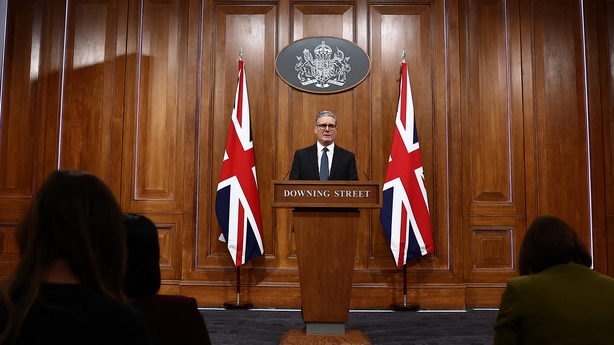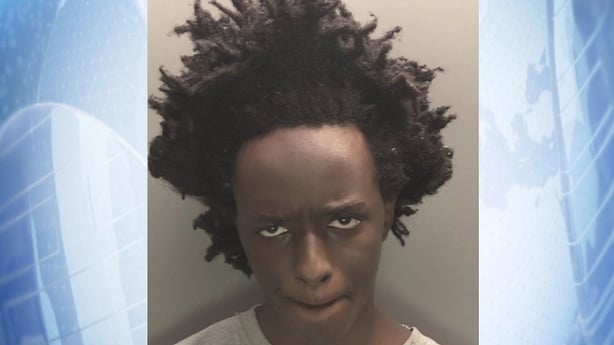The definition of terrorism in the UK needs to change in the face of a new threat from attackers radicalised by extreme violence, Prime Minister Kier Starmer has said.
Speaking at Downing Street, Mr Starmer said current laws are set up to deal with terrorism that is linked to organised groups or particular extremist ideologies, but a new threat has emerged posed by loners who obsessively view harrowing content online.
He said the UK government would urgently consider changes before the inquiry announced into the Southport attacks had concluded, taking into account failings exposed in the way the Prevent anti-terror programme operates.
Asked if he personally considered the atrocity to be a terror attack, Mr Starmer told journalists that while the Southport murders had not been classed as terrorism, they were "extreme violence, clearly intended to terrorise".
"My concern is that because it is different to the sort of behaviour we've associated with terrorism - al Qaida, there are plenty of other examples, which tended to be more organised in groups with a clear political ideology and motive - because it is not that, it is a new and different threat, it doesn't fit as well as it should within our framework.
"That is what we've got to change. That is the urgent question that has to be addressed and it's one that has to be addressed before the conclusion of the inquiry and it's why we've already done the learning from the Prevent mistakes."
Watch: 'Disgrace' that Southport killer could order knife from Amazon, says UK minister
Police and security services have been warning over the past few years about the emerging threat of attackers who have no fixed ideology.
But Prime Minister Starmer compared what he described as a "new" threat to the mass school shootings seen in the United States, adding: "It is not an isolated, ghastly example, it is a different kind of threat and that is why I'm absolutely so determined that we will rise to that challenge and make sure that our law, our response, is capable, appropriate, and can deal with that sort of threat.
"But that is my concern, that is my thinking that this is a new threat - individualised extreme violence, obsessive, often following online viewing of material from all sorts of different sources."

Alex Rudakubana yesterday pleaded guilty on the first day of his trial at Liverpool Crown Court to murdering the three young girls.
Rudakubana, of Banks, Lancashire, was charged with the murders of nine-year-old Alice da Silva Aguiar, six-year-old Bebe King and seven-year-old Elsie Dot Stancombe, who died following the attack at a Taylor Swift-themed dance class at The Hart Space on 29 July.

He also pleaded guilty to the attempted murder of ten other people - eight children, who cannot be named for legal reasons, class instructor Leanne Lucas and businessman John Hayes in the same incident.
Rudakubana was 17 at the time of the attack.
'Loners and misfits'
Alongside the current terror threat from organised groups, Mr Starmer said the UK is seeing "acts of extreme violence perpetrated by loners, misfits, young men in their bedroom accessing all manner of material online".
It has become increasingly difficult for law enforcement in Britain to define whether an act of extreme violence is terrorism because suspects have often accessed such a wide range of material online and do not appear to support one ideology.
UK counter-terrorism police will assist in complex investigations either way, as they did with Southport, to boost resources and speed up processes such as analysing content found on phones, laptops and other digital devices.
Last month senior national co-ordinator of UK counter-terrorism policing Vicki Evans said investigators are increasingly seeing suspects who have accessed a range of violent material but that a specific ideology which may have motivated an attack can be extremely difficult to pin down.
She said officers are seeing suspects with search histories like "a pick and mix of horror".
This could include material linked to school shootings, mass violence, extreme pornography, pro-incel material, and misogynistic and racist content.
Sometimes the harrowing material tips over into terrorism, and other times not.
But police say motivation needs to be established for attacks to be classed as terrorism.
Perpetrators holding mixed ideologies, which can sometimes be complicated to interpret, can be one of the reasons why it may take time to determine.
Not all violent incidents, even some atrocities involving multiple victims, are declared terror attacks.
Cases of extreme violence in which hatred is a factor more often than not do not meet the legal definition of terrorism.
UK terror watchdog Jonathan Hall said questions over why the incident was not treated as a terrorist attack and whether it could have been prevented were "completely legitimate" as he urged people to wait to hear the details of the case are set out at the sentencing on Thursday, and cautioned against misinformation online.

